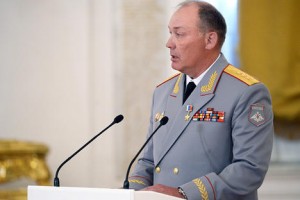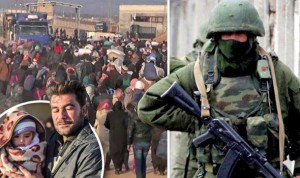2016-03-28 By Richard Weitz
The Russian media has recently given prominence to the role of Russian Special Operations Forces (SOF) in the military operation in Syria.
The Russia media confirmed the death of a Russian Special forces officer conducting forward air control had called an artillery strike on his own position after he was discovered and attacked by “terrorists.”
Even more revealing was the interview given by Colonel General Aleksandr Dvornikov, commander of the Russian contingent in Syria, to the Rossiyskaya Gazeta newspaper.
Dvornikov provided the first official confirmation that Russian SOF “conduct ground reconnaissance of pre-selected targets for Russian warplanes, assist in targeting warplanes in remote areas and perform other tasks.”

The General also said that Russian military advisors, which might also be SOF, provided critical air support, help train the Syrian military and other local forces such as the Kurdish military to Russian weapons, and assist them with operational planning.
“To boost the capabilities of the Syrian Army we provided advanced arms and hardware, including artillery systems, communications and reconnaissance equipment.”
The General also correctly boasted that Russian military intervention in Syria in late September 2015 saved the Syrian government from likely defeat.
A good starting point for considering the forces in Crimea is Mark Galeotti’s book ‘Spetsnaz’, which considers the history of the Russian SOF and how they had a central role in the hybrid war in Crimea and Eastern Ukraine.
The Spetsnaz is a designed for low-intensity conflict and fits somewhere in between an intelligence service and a conventional army.
Galeotti argues that the Spetsnaz have had different “identity crises” over the years. The role of the Spetsnaz has been widely debated within Russia since it was formed. Initially in the Russian Civil War, the precursors to the Spetsnaz was a guerilla war force run by the Political Police (NKVD – later KGB ) and a paratrooper force under direction of the Main Intelligence Directorate (GRU).
The Spetsnaz was formally established in 1950 under the direction of the GRU’s Naval Intelligence Directorate. While the Spetsnaz have remained under GRU control, they have been under the command of each branch of the military in their history: the Ground Forces, the Navy, and the Aerospace Forces.
In 2010, after the Georgia war, there were calls for the Spetsnaz to fall under a command other than the GRU. The airborne units argued that their VDR paratroop forces are very similar to the GRU, but the General Staff under the ground forces won this argument and the Spetsnaz briefly fell under General Staff Command.
However, the Spetsnaz was returned to GRU direction in 2013.
Phillip Karber of the Potomac Foundation offers five categories of Russian New Generation Warfare, ranging from a low level of conventional warfare intensity and a low degree of state responsibility to a high intensity and a high degree of state responsibility. The categories, from low to high, are: political subversion, proxy sanctum, intervention, negotiation, and coercive deterrence.
The categories of political subversion and proxy sanctum are the domain of irregular forces. Political subversion requires the “[seizure] of government buildings and checkpoints, sabotage, assassination, terrorism, propaganda and media campaign [and the] insertion of agents.”

http://www.express.co.uk/news/world/641550/Syria-war-Russian-spetsnaz-Aleppo-ISIS-70000-refugees-flee
The category of proxy sanctum also utilizes irregular forces, as the Russian state “consolidate[s] controlled areas, and core cadre, ‘volunteers,’ and militia destroy government infrastructure.”
In Crimea and eastern Ukraine, the Russian Federation has employed irregular forces in rapid localized actions that present others with fait accompli and, through staged incidents of supposed attacks against Russian interests or humanitarian crises, justify more direct Russian military intervention in addition to rendering diplomatic, logistical, and other non-military support for Russian operations.
Russia’s SOF have rendered technical and tactical training to the Ukrainian separatists as well as helped them organize a command-and-control system.
Furthermore, Russia’s SOF have exploited their deep penetration of the Ukrainian government’s armed forces and other security forces to help the Russian authorities and their local allies monitor, assess, and disrupt the Ukrainian government’s response.
At first, the Ukrainian authorities lacked confidence in their established military and internal security forces and created less effective paramilitary units that sometimes had extreme anti-Russian ideologies that exacerbated tensions.
In addition, Russian irregular forces have delivered weapons to pro-Russian separatists under the guise of rendering help to distressed populations.
This tactic involves delivering relief aid to territories in which Russia has created the conditions for a humanitarian crisis in the first place, thereby allowing Moscow to provide both “bullets and bandages.”
Moreover, when Moscow’s adversaries object to the Russian deliveries on foreign territory without the national government’s permission, Moscow can exploit this seeming indifference to humanitarian suffering as well as then show that it can ignore the foreign government’s wishes.
Under Putin, the special forces have also been used as political instruments.
They have conducted assassinations and sabotage operations against adversaries and provided a pretext for more overt and intrusive Russian intervention.
For example, they helped organize the South Ossetia militias, whose attacks helped provoke the Georgian government into launching its disastrous offensive in August 2008.
The Baltic authorities are now worried that the Russian special forces will work with local collaborators to create similar provocations and pretexts for Russian intervention in their countries.
In the future, the special forces aim to improve their ability to operate in small units supported by drones and other novel technologies for specialized missions, such as assassinating terrorists and warlords (including out-of-control proxies).

